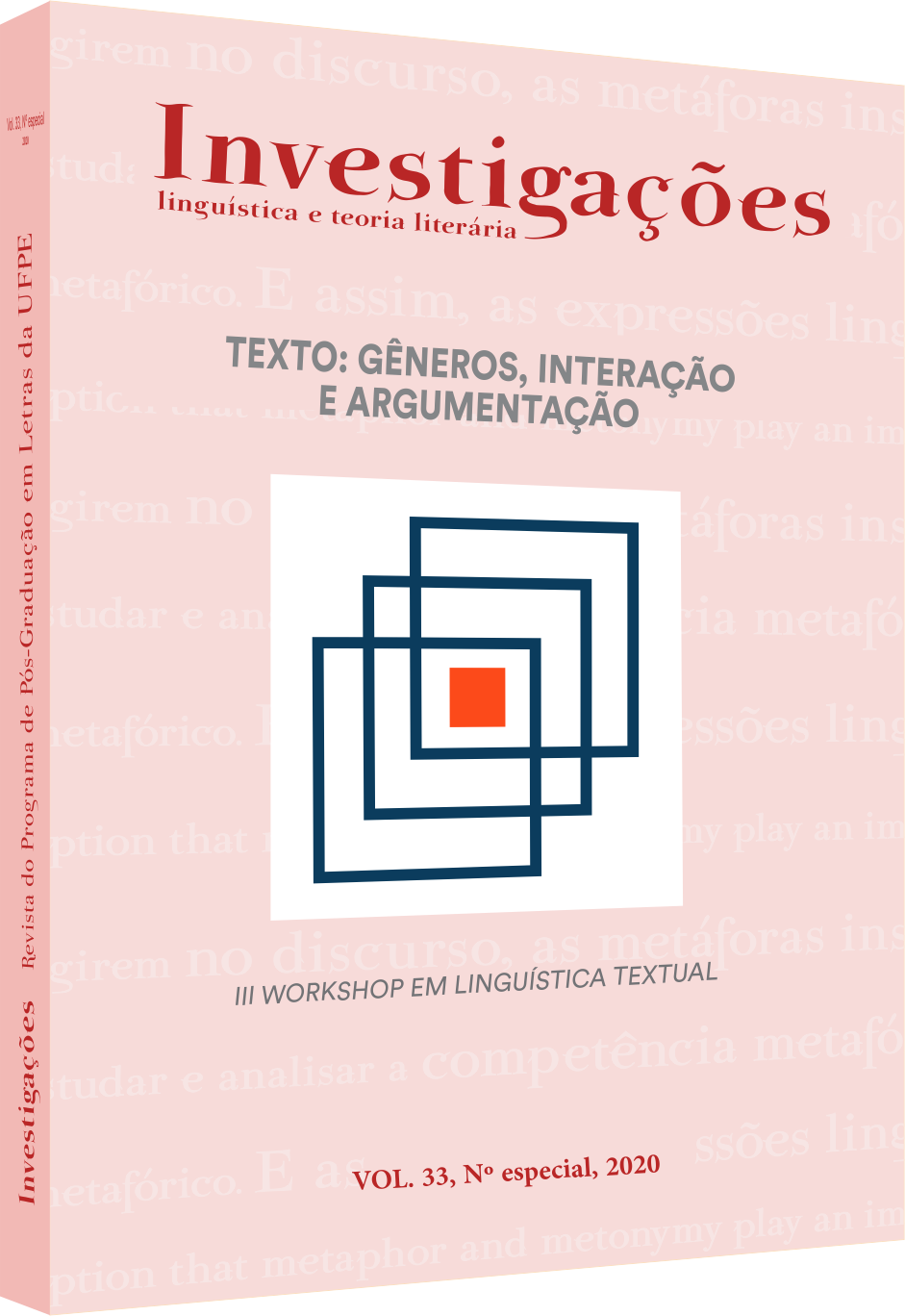A descortesia como estratégia argumentativa em interações virtuais polêmicas
DOI:
https://doi.org/10.51359/2175-294x.2020.244409Keywords:
social networks, argumentation, controversy, (un)politeness.Abstract
The argumentation tries to influence the other through various textual/discursive strategies, among then we highlight (un)politeness. This work aims to point out aspects that allow to interface between an approach on Argumentation developed by Amossy (2017, 2018) and a sociopragmatic perspective of (un)politeness (MARLANGEON, 2014, 2017; BRAVO, 2005, 2010). This interface is illustrated by the exchanges between common users of Instagram, with the comments of a publicity/news on the page of a journal (@ portalg1). We must assume that the indices of (un)politeness present will comment to us in a similar way to the attempts to dequalify the other controversies.References
AMOSSY, R. A argumentação no discurso. Trad. Eduardo Lopes Piris et al. São Paulo: Contexto, 2018 [2000].
AMOSSY, R. Apologia da polêmica. Trad. Mônica Magalhães Cavalcante et al. São Paulo: Contexto, 2017 [2014].
BRAVO, D. Categorías, tipologías y aplicaciones. Hacia una redefinición de la cortesía comunicativa. Estudios de la (des) cortesía en español. Categorías conceptuales y aplicaciones a corpora orales y escritos, v. 1, p. 21-52. 2005.
BRAVO, D. Pragmática socio-cultural: La configuración de la imagen social como premisa socio-cultural para la interpretación de actividades verbales y no verbales de imagen. In: ORLETTI, Franca; MARIOTTINI, Laura (Ed.). (Des)cortesia en español: espacios teóricos y metodológicos para su estudio. Roma-Estocolmo: Università Degli Studi Roma, 2010. p. 19-46.
BROWN, P.; LEVINSON, S. Politeness: some universals in language usage. Cambridge: Cambridge University Press, 1987.
CABRAL, A. L. T. Violência verbal e argumentação nas redes sociais: comentários no Facebook. Calidoscópio – v. 17, n. 3, setembro-novembro 2019.
CULPEPER, J. Impoliteness using language to cause offense. Cambridge, Cambridge University Press, 2011. 292 p.
KAUL DE MARLANGEON, S. B. Encuadres de aspectos teóricos-metodológicos de la descortesía verbal en español. In: (Org.) MORALES, J. E., VEGA, H. G. Miradas multidisciplinares a los fenómenos de cortesía y descortesía en el mundo hispánico. 1a ed. Barranquilla-Estocolmo: Universidad del Atlántico - Universidad de Estocolmo; CADIS – Programa EDICE, 2012, 761 págs. ISBN: 978-958-8742-25-0
KAUL DE MARLANGEON, S. B. Delimitación de unidades extralinguísticas de análisis del discurso de (des)cortesia. Signo y Seña. Buenos Aires, n. 26, p. 7-21, dez. 2014.
KAUL DE MARLANGEON, S. B. Contribuições para o estudo da descortesia verbal. In: Descortesia e cortesia: expressão de culturas. (Org.) Ana Lúcia Tinoco Cabral, Isabel Roboredo Seara, Manuel Francisco Garanha. São Paulo: Cortez, 2017.
KERBRAT-ORECCHIONI, C. Abordagem intercultural da polidez linguística: problemas teóricos e estudo de caso. In: CABRAL, A. L. T.; SEARA, I. R.; GUARANHA, M. F. (Orgs.). Descortesia e cortesia: expressão de culturas. São Paulo: Cortez, 2017. p.17-56.
KERBRAT-ORECCHIONI, C. Análise da conversação: princípios e métodos. Tradução Carlos Piovezani Filho. São Paulo: Parábola Editorial, 2006.
LEECH, G. Principles of pragmatics. New York: Longman, 1983.
MUNIZ-LIMA, Isabel. Modos de interação digital no hipergênero webnotícia. In: III Workshop em Linguística Textual: texto, discurso, gênero e interação, 2019. Fortaleza: UFC, 2019.
PLANTIN, C. L’argumentation. Paris: PUF, 2005 [A argumentação: história, teorias, perspectivas. Tradução de Marcos Marcionilo. São Paulo: Parábola, 2008].
SEARA, Isabel Roboredo; CABRAL, Ana Lúcia Tinoco. O comentário elogiativo nas redes sociais: estratégias de cortesia valorizadora. Revista da Associação Portuguesa de Linguística. n. 3 09/2017, p. 311-332. Disponível em: <https://doi.org/10.26334/2183-9077/rapln3ano2017a17> Acesso em 18/01/2020.
Downloads
Published
How to Cite
Issue
Section
License
Copyright (c) 2020 Jessica Oliveira Fernandes, Mônica Magalhães Cavalcante

This work is licensed under a Creative Commons Attribution 4.0 International License.
Authors who publish with Revista Investigações agree to the following terms:
Authors retain copyright and grant the journal right of first publication with the work simultaneously licensed under the Creative Commons Attribution 4.0 International (CC BY 4.0) license that allows others to share the work with an acknowledgement of the work's authorship and initial publication in this journal.
Authors are able to enter into separate, additional contractual arrangements for the non-exclusive distribution of the journal's published version of the work (e.g., post it to an institutional repository or publish it in a book), with an acknowledgement of its initial publication in this journal.
You are free to:
Share — copy and redistribute the material in any medium or format for any purpose, even commercially.
Adapt — remix, transform, and build upon the material for any purpose, even commercially.
The licensor cannot revoke these freedoms as long as you follow the license terms.
Under the following terms:
Attribution — You must give appropriate credit , provide a link to the license, and indicate if changes were made . You may do so in any reasonable manner, but not in any way that suggests the licensor endorses you or your use.
No additional restrictions — You may not apply legal terms or technological measures that legally restrict others from doing anything the license permits.

